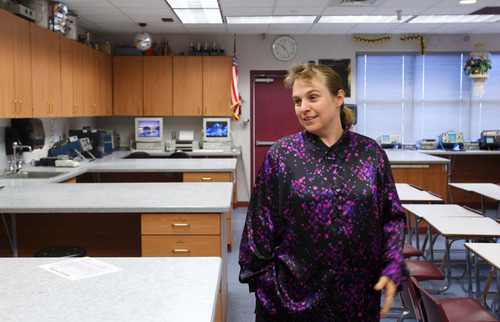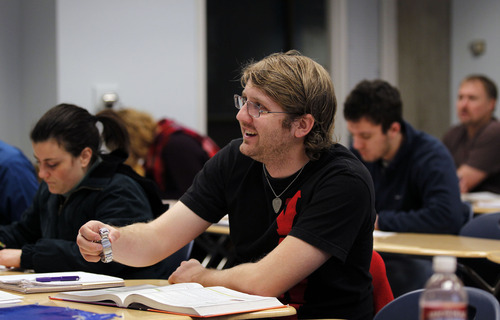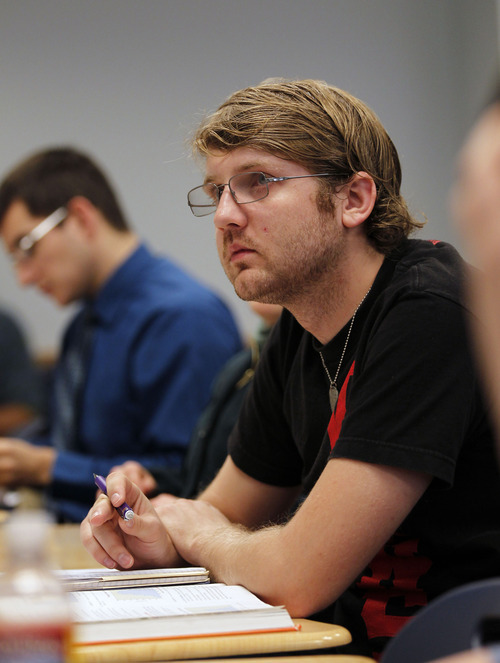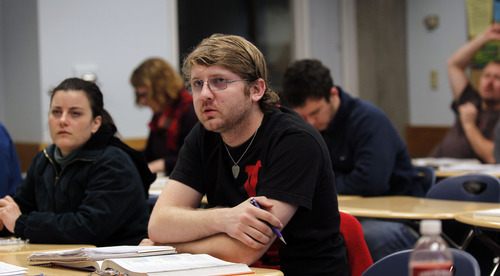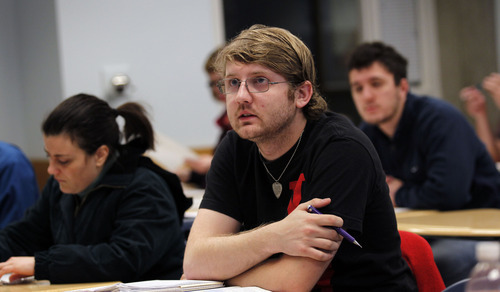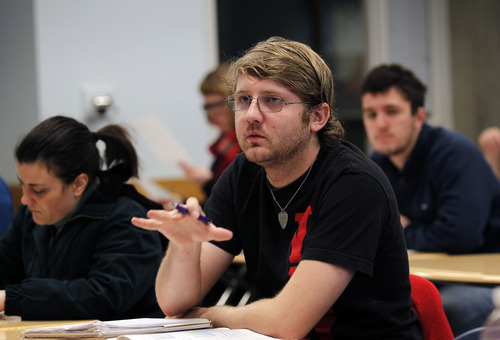This is an archived article that was published on sltrib.com in 2012, and information in the article may be outdated. It is provided only for personal research purposes and may not be reprinted.
Colorado City, Ariz. • Thomas Barlow was about 16 when his education came to a halt.
"I wasn't done with school, I didn't feel like I was finished. I wanted to keep going," said Barlow, a voracious reader who as a child devoured biographies of famous Americans. "I didn't want to be in construction when I was as old as my father."
His father put him to work anyway. Had he been in public school, a sudden absence might have been noticed. But Barlow, now 23, grew up in a Utah-Arizona border town as a member of the polygamous sect led by Warren Jeffs.
Like all young members of the sect, he was pulled out of public school in 2000 at Jeffs' order. Children in the sect are educated at home.
And in both states, the government stays out of home-schools. Utah school districts are forbidden from making parents keep records of instruction or attendance, requiring them to have any teaching qualifications or testing home-school students.
Twelve years after Jeffs' edict, an educational dichotomy has appeared within the Fundamentalist Church of Jesus Christ of Latter-Day Saints: While local educators say some young people seem to get an education roughly on par with those in public school, advocates say hundreds more see their schooling stop at the eighth grade or before.
Some "can't read, they can't do math, they can't even do simple addition. They don't know that man landed on the moon. It's a problem if you're trying to live in the world and you don't have these basic skills," said social worker Pat Merkley, clinical coordinator for Utah's Safety Net Committee. "The parents have the right to teach their kids as they see fit, but where are the children's rights to learn?"
New turmoil within the community may be putting children even further behind, but legally, state education officials can do little.
The Legislature firmly backs Utah's hands-off approach, and with home-schooling on the rise statewide, parents who want to improve on the public-school experience say more laws would unfairly stifle their rights.
"The idea that government should be the ultimate authority over educating children is bogus," said Sen. Mark Madsen, R-Eagle Mountain, sponsor of a 2005 bill to keep government out of home-schools. "If we're going to use government resources and focus government attention on solving problems, let's go where the problems really exist."
—
'Children's education pays the highest price' • When Jeffs told followers to take their kids out of public schools, enrollment at the school that serves the sect's home base of Colorado City, Ariz., and Hildale, Utah, dropped from about 1,200 students to 230.
"It was devastating," said Carol Timpson, principal at El Capitan Public School.
The group initially set up priesthood schools that in many ways replicated the public-school experience, though with an emphasis on morals and sect history, Barlow said. About 2007, shortly after he started working construction, those schools closed and education moved solely to members' homes.
Joseph Broadbent, now 23, said his father ended his education at age 13 or 14.
"I begged him and begged him to [let me] finish the 10th grade," Broadbent said. Instead, he learned the welding business.
Broadbent said he also suffered physical abuse at home and left the sect about six years ago. When the construction work dried up, he made plans to get his GED.
But the years out of school took their toll. He has taken the test four times and failed. For now, he is back to welding.
Home-schooling is a challenge, Barlow said.
While his mother and sisters are "doing the best they can," he says that at home, education can lose its "rigidity."
"[It can be] 'I know it's school time but I want to sleep, it's just Mom, whatever,' " he said. "That doesn't bode well for the future of my brothers and sisters."
For his own part, he left the sect about two years ago after a foreman on a construction job took away his computer — his window to the outside world of anime he'd grown to love. He now attends Salt Lake Community College and lives in Sandy, but worries about his 10 younger siblings.
"I know they're smart. I just wish they had all the opportunities they can get," he said.
Still, in a home-school environment, education is by nature different in every house — and some sect members seem to be sufficiently educated.
Carolyn Hamblin, dean at Mohave Community College's campus in Colorado City, said she has found home-school students generally score higher on entrance exams and maintain higher grade point averages than other students.
Willie Jessop, a former sect spokesman who has now broken away from Jeffs, said a dichotomy has become the norm.
"Either families have got a very good system of being able to monitor their children and regulate their education, or they're in la-la land," he said. "You're not going to see a great deal of anything in between."
A new crackdown by Jeffs — now serving a life sentence in a Texas prison for sexually assaulting two underage girls he took as polygamous wives — has also taken a toll on education, Jessop said. More than 100 people have been excommunicated since last year and behavior has become more tightly restricted, including a ban on Internet usage.
"Due to the social crisis of this community as a whole, education has suffered terribly," Jessop said. "The breaking up of families, who's in and who's out … children's education pays the highest price every time."
Some 400 young people who have left or been forced out of the FLDS sect over eight years have come to the nonprofit Diversity Foundation for help, according to director Shannon Price.
How many are behind on their education?
"One hundred percent," Price said.
—
'The parents' responsibility' • One possibility is checking in on home-schools through student testing. Other states require credentials for parents who want to teach and ask them to keep records of their teaching.
But Ann Wright, a member of Centennial Park, a separate polygamous sect south of Colorado City, disagrees. Most parents choose home-schooling because they value their kids' education and "don't like what the government is doing in their own schooling."
Wright, who has alternated between teaching her children at home and sending them to public school, said home-schooling allowed her to start their education at a younger age.
"It helped give them a good start when they started school," she said. "We want to give our children the opportunity to be critical thinkers."
Students also can fall through the cracks in public school, and in Centennial Park "we very seriously believe that it's the parents' responsibility," she said.
Mainstream home-schooling advocates agree and say educational neglect is rare.
Home-school students, on average, scored 34 to 39 percentile points above public-school students on standardized achievement tests, according to a 2010 study by Brian Ray, president of the National Home Education Research Institute. But critics point out that part of the testing pool was self-selecting and wonder if they would have done equally well had they been attending public schools.
"If a parent doesn't care to educate their kids, why wouldn't they send them to an eight-hour baby-sitter that's free? Why would a parent keep their kid home just for the heck of it?" asked Petter Olsen, president of the Utah Home Education Association. "Parents who home-educate are much more involved in their children's educations than your average parent."
Utah lawmakers agree.
Madsen's bill, which specifically barred the state from testing kids or otherwise monitoring home-school students, sailed through the Legislature, passing unanimously.
In Utah, parents who want to home-school are required to file an affidavit with the school district annually for each child. They must pledge to instruct their children in the same subjects taught in public school for the same length of time, but there's no method of policing whether the affidavits have been filed or legal consequences if they are not.
In Arizona, parents have to file one affidavit when the home-schooling begins and inform the district again when it ends. The state repealed a testing requirement for the parent in 1991 and a standardized test requirement four years later, according to Home School Legal Defense Association (HSLDA).
The HSLDA ranks both states among 14 "low-regulation" states, requiring more from parents than the states that don't ask for any notification, but less than high-regulation states. Peter Kamakawiwoole, an HSLDA staff attorney, said Utah is "a very friendly state to home-schoolers in that respect."
Perhaps due to that friendly environment, the number of home-schooled kids in Utah has grown. The number of affidavits grew steadily between 2004 and 2009, when the numbers increased to 9,177 students, or what would have been 1.7 percent of the public-school population.
The numbers dropped again in 2010 and 2011, likely due to home-school parents enrolling in online programs that use school curriculum. But with that growth has come concern, and not only about polygamous communities.
Carol Lear, director of school law at the State Office of Education, said some home-school parents do a "phenomenal job," but she said her office also typically gets about 10 calls a year from neighbors, grandparents and relatives concerned that a home-school child they know isn't being properly educated.
She encourages those people to call their local districts and the Division of Child and Family Services to see if they can help, but really, she said, the state has little power to act.
Child Protective Services doesn't investigate allegations of educational neglect unless a school district requests help after exhausting its own resources — something a department spokeswoman said hasn't happened in years.
"That home-schooling law we have now in statute has been weakened considerably over the last 10 years … in terms of the state's ability to have any kind of standard for student achievement, to have any kind of testing that's required, any kind of review of a curriculum," said Lear.
Some school districts have generally been less aggressive in confronting parents since a Marion confrontation in 1979 when police shot polygamist John Singer, who had refused to let his children attend school, she said.
Kamakawiwoole said HSLDA doesn't believe regulating home-schoolers more would help anything.
"Just the fact that you add on layers of regulation doesn't mean you're actually going to achieve the goal of making it safer for children," he said. "It does mean it's going to be harder for parents to develop the programs that will best suit their children's needs," he said.
—
'Desire to learn' • Educators now are getting one of their first glimpses in years into how FLDS kids are doing, after a group of FLDS people who split from Jeffs to follow a rival prophet sent their kids back to public school.
About 70 new students have enrolled at El Capitan since last year, principal Timpson said. Culturally, they remain FLDS, often wearing the iconic prairie dresses and long sleeves, but are weaving into the school's social fabric as the older kids join sports teams and the younger ones hug their teachers.
In terms of their education, Timpson said, "at least half" are on grade level, which she considers within a year of their mainstream peers. One gifted 10-year-old is in a sixth-grade class, while a handful of teens are in elementary-level classes.
Those furthest behind are kids with learning disabilities or special needs. Had they started public school in kindergarten, they would have had special instruction from the beginning.
Now, "we've lost all those years," Timpson said.
FLDS parents also usually start their children's education a year later than a typical public-school student, putting them behind when they start school.
Craig Chatwin, who teaches seventh through 12th grade, said his students have been typically "well below grade level." They are usually more advanced in math than in English.
"They come with the desire to learn. I'm not worried about them at all," he said.
Instead of advocating for a new law, or mandated testing, Timpson is interested in a third option: making more resources available to parents who teach their kids at home and encouraging them to monitor their students' progress.
"The biggest challenge is getting them to walk through the door," she said. Once they do, she finds that children adapt quickly to the new environment — and so do parents. "They show up. They take an interest … It's been just great."
Twitter: @lwhitehurst
The Polygamy Blog: bit.ly/Ar3JVq
Twitter: @lschencker —
Home-schooling in Utah
School districts with the highest rate of home-schooled students:
North Sanpete 3%
Uintah 2.96%
Davis 2.6%
South Summit 2.4%
Iron 2.37%
Source: Utah State Office of Education, provided as a ratio of home-school students per 1,000 public school students.


